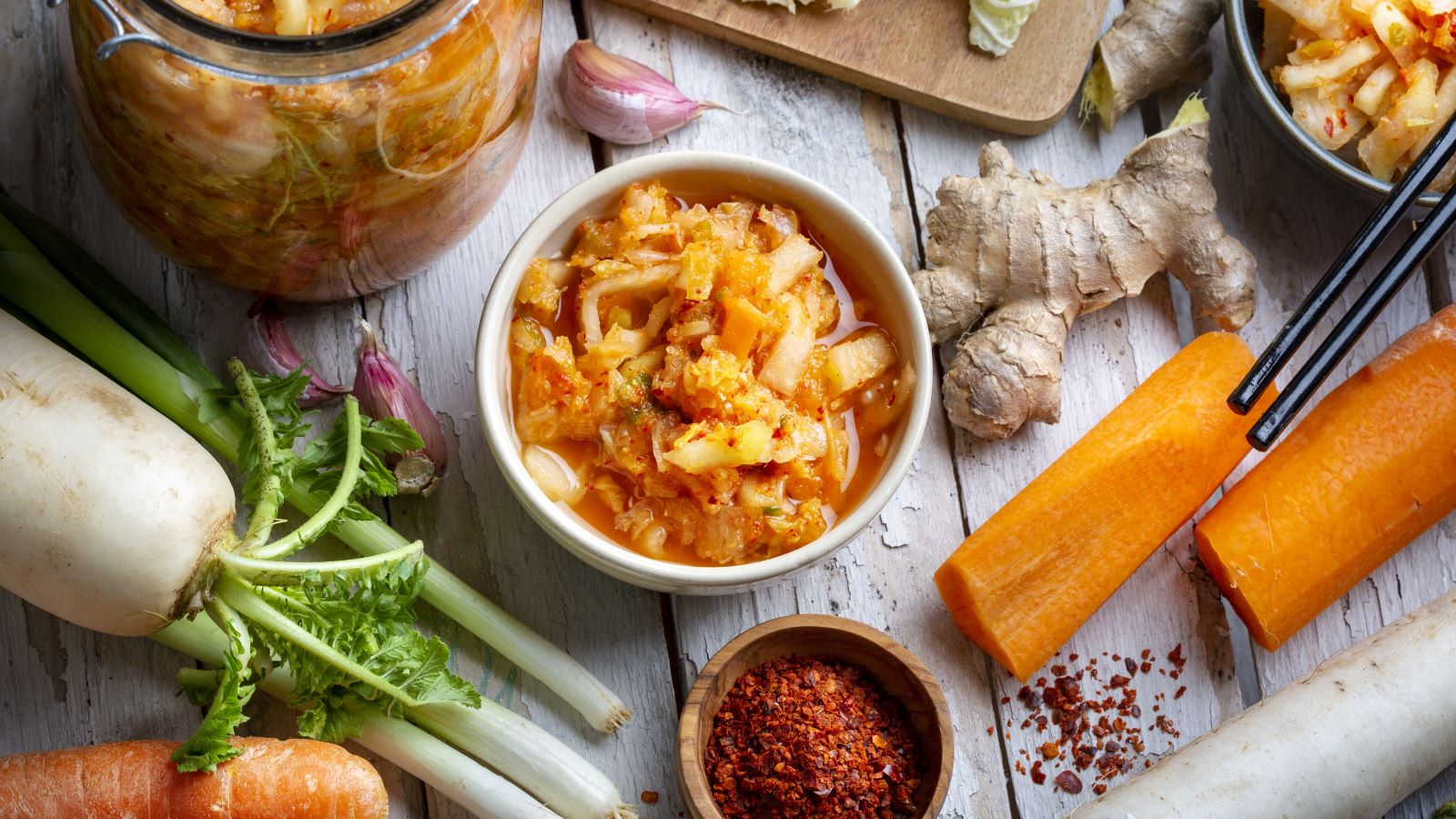<< Back
The 10 Best Foods for Your Gut Health

November 10, 2025
Bloating after lunch? Stomach just feeling a little off?
Digestive issues are common — but the foods you eat can make a big difference in how your gut feels every day.
“Your gut microbiome is at the center of your health and a deficient biome may be the root of development for diseases,” says Ulysses Wu, MD, with Hartford HealthCare. “So it’s important to feed it well. Certain foods help balance gut bacteria, reduce inflammation and keep digestion moving.”
Here are ten of the best foods to keep your gut happy.
1. Yogurt (with live cultures)
Yogurt is creamy, tangy and naturally packed with probiotics — the kind of bacteria your gut loves.
“Look for labels with ‘live and active cultures,’” says Dr. Wu. “You can spend money on expensive probiotics, but getting them through food sources may be more beneficial – and it’s definitely tastier.”
Try it: Enjoy a bowl of plain yogurt with fruit and a drizzle of honey.
> Related: 4 Reasons to Eat More Greek Yogurt
2. Kefir
Think of it as yogurt’s bubbly cousin. Kefir is packed with probiotics and usually easier on digestion, even if you’re sensitive to lactose.
“Kefir offers a wider variety of probiotics,” notes Dr. Wu. “It’s great for nurturing a diverse gut ecosystem.”
Try it: Pour it over granola or sip it straight for a tangy kick.
> Related: 5 Ways to Protect Your Gut Microbiome
3. Sauerkraut (and other fermented veggies)
It’s a crunch, tangy powerhouse of probiotics, thanks to the fermentation.
“Fermented vegetables like sauerkraut have tons of gut-supporting bacteria, you just have to look out for the sodium content,” says Dr. Wu. “And don’t limit your sauerkraut consumption to hotdogs and bratwursts – it can be used with plenty of other foods, too.”
Try it: Add a spoonful to your sandwich.
> Related: 5 Supplements That Can Help Your Gut Feel Its Best
4. Kimchi
Think of kimchi as a spicy, flavorful way to boost both probiotics and antioxidants.
“Kimchi is a gut and immune system double threat,” says Dr. Wu. “Pick varieties with low added sugar and enjoy it chilled. Kimchi isn’t just a garnish, it can be a great addition to anything from salad to meat or sandwiches – anywhere you would typically use pickles. You can even eat it right out of the jar!”
Try it: Incorporate into rice bowls or tacos.
5. Oats
Rich in soluble fiber called beta-glucan, oats help feed crucial gut bacteria.
“Fiber isn’t just about digestion — it’s prebiotic fuel,” says Dr. Wu.
Try it: Make overnight oats with milk and berries for an easy gut-soothing breakfast.
6. Apples (with the skin on)
Apples aren’t just delicious, they’re also packed with pectin – the prebiotic fiber that helps friendly bacteria flourish.
“Pectin supports gut diversity. Just be sure to leave the skin on to get the full effect,” says Dr. Wu. “There are all sorts of new varieties worth trying – EverCrisps, Cosmic Crisp, SweeTango, Rave and Snap Dragons, which are sweeter and juicier than what you might be used to.”
Try it: Slice and pair with nut butter or toss into overnight oats.
> Related: What Can (and Can’t) Apple Cider Vinegar Help With
7. Beans and legumes
From lentils to chickpeas, these fiber-filled staples are great for keeping things moving.
“Legumes offer both fiber and resistant starch — excellent prebiotic sources,” says Dr. Wu.
Try it: Plain or spiced, add to salads, soups, or wraps.
> Related: 4 Reasons to Eat More Lentils
8. Flaxseeds and chia seeds
Tiny but mighty, these are packed with fiber and omega-3 linolenic acid.
“These seeds help build bulk and support digestive balance,” says Dr. Wu.
Try it: Stir these into your morning smoothie, yogurt or salad.
> Related: 7 Healthy Seeds to Add to Your Diet
9. Miso
Savory, rich and packed with umami, miso is one of the most underrated foods in your kitchen. This fermented soybean paste doesn’t just add flavor – it also delivers probiotics, prebiotics and anti-inflammatory benefits.
“Miso is a true powerhouse ingredient,” says Dr. Wu. “It’s often that extra mystery ingredient in stews, soups, dressings or marinades, that people love but can’t identify. I add it to almost everything.”
Try it: Whisk a spoonful into salad dressing, stir it into soup or mix it with olive oil and garlic for a quick, flavorful marinade.
10. Kombucha
Kombucha has earned its place as the go-to probiotic drink.
“The flavor might take some getting used to, but many have fallen in love with it. Kombucha is a refreshing way to get probiotics, without the added sugar,” says Dr. Wu.
Try it: Drink it straight in the morning or evening, or mix with sparkling water, citrus and fresh herbs for an easy mocktail.
> Related: Prebiotics vs. Probiotics: What’s the Difference?
Not sure where to start?
Making gut-friendly swaps isn’t about total diet overhauls. It’s about layering in foods that nourish your microbiome and ease digestion.
“If you’ve been on antibiotics, they have likely altered your gut flora, so these foods are even more important to replenish your microbiome,” Dr. Wu urges.
Even adding just one or two of these foods each week can help.
“Long term consistency is what really makes an impact,” says Dr. Wu.